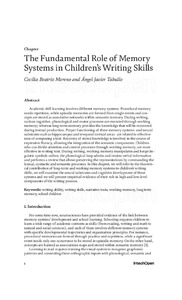Por favor, use este identificador para citar o enlazar este ítem:
https://repositorio.uca.edu.ar/handle/123456789/16472| Campo DC | Valor | Lengua/Idioma |
|---|---|---|
| dc.contributor.author | Moreno, Cecilia Beatriz | es |
| dc.contributor.author | Tabullo, Ángel Javier | es |
| dc.date.accessioned | 2023-06-05T18:56:03Z | - |
| dc.date.available | 2023-06-05T18:56:03Z | - |
| dc.date.issued | 2023 | - |
| dc.identifier.citation | Moreno, C. B., Tabullo, Á. J. The fundamental role of memory systems in children’s writing skills [en línea]. En: Burman, D. Hippocampus : more than just memory. Londres : IntechOpen, 2023. doi: 10.5772/intechopen.110470. Disponible en: https://repositorio.uca.edu.ar/handle/123456789/16472 | es |
| dc.identifier.uri | https://repositorio.uca.edu.ar/handle/123456789/16472 | - |
| dc.description.abstract | Abstract: Academic skill learning involves different memory systems. Procedural memory needs repetition, while episodic memories are formed from single events and concepts are stored as associative networks within semantic memory. During writing, various cognitive, phonological and motor processes are executed through working memory; whereas long-term memory provides the knowledge that will be recovered during textual production. Proper functioning of these memory systems -and neural substrates such as hippocampus and temporal cortical areas- are related to effectiveness of composing a text. Recovery of stored knowledge is involved in the course of expressive fluency, allowing the integration of the semantic components. Children who can divide attention and control processes through working memory, are more effective in writing text. During writing, working memory manipulates and keeps linguistic symbols online; the phonological loop admits and retains verbal information and performs a review that allows preserving the representations by commanding the lexical, syntactic and semantic processes. In this chapter, we will refer to the theoretical contribution of long-term and working memory systems to children’s writing skills, we will examine the neural substrates and cognitive development of these systems and we will present empirical evidence of their role in high and low-level components of the writing process. | es |
| dc.format | application/pdf | es |
| dc.language.iso | eng | es |
| dc.publisher | IntechOpen | es |
| dc.relation | Producción de textos y funcionamiento ejecutivo en niños y niñas de edad escolar | - |
| dc.rights | Acceso abierto | * |
| dc.rights.uri | http://creativecommons.org/licenses/by-nc-sa/4.0/ | * |
| dc.source | Burman, D. Hippocampus : more than just memory. Londres : IntechOpen, 2023 | es |
| dc.subject | ESCOLARIDAD | es |
| dc.subject | MEMORIA DE TRABAJO | es |
| dc.subject | ESCRITURA | es |
| dc.subject | HABILIDADES COGNITIVAS | es |
| dc.subject | TEXTOS NARRATIVOS | es |
| dc.title | The fundamental role of memory systems in children’s writing skills | es |
| dc.type | Parte de libro | es |
| dc.identifier.doi | 10.5772/intechopen.110470 | - |
| uca.disciplina | EDUCACION | es |
| uca.issnrd | 1 | es |
| uca.affiliation | Fil: Moreno, Cecilia Beatriz. Pontificia Universidad Católica Argentina. Facultad de Humanidades y Ciencias Económicas; Argentina | es |
| uca.affiliation | Fil: Tabullo, Ángel Javier. Consejo Nacional de Investigaciones Científicas y Técnicas; Argentina | es |
| uca.version | publishedVersion | es |
| item.fulltext | With Fulltext | - |
| item.languageiso639-1 | en | - |
| item.grantfulltext | open | - |
| crisitem.author.dept | Facultad de Humanidades y Ciencias Económicas (Mendoza) | - |
| crisitem.author.orcid | 0000-0003-2161-3167 | - |
| crisitem.author.orcid | 0000-0002-1340-0156 | - |
| Aparece en las colecciones: | Libros/partes de libro | |
Ficheros en este ítem:
| Fichero | Descripción | Tamaño | Formato | |
|---|---|---|---|---|
| fundamental-role-memory-systems.pdf | 275,1 kB | Adobe PDF |  Visualizar/Abrir |
Visualizaciones de página(s)
95
comprobado en 27-abr-2024
Descarga(s)
51
comprobado en 27-abr-2024
Google ScholarTM
Ver en Google Scholar
Altmetric
Altmetric
Este ítem está sujeto a una Licencia Creative Commons

